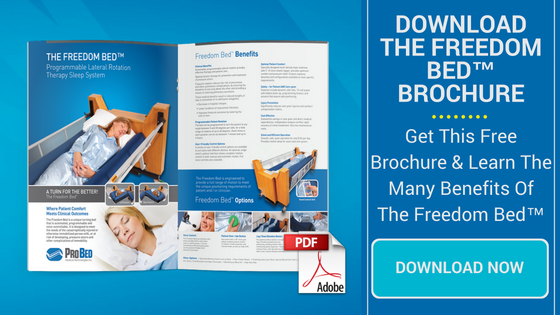
The concerns and stress related to the direct costs of caring for an immobilized family member or friend can be overwhelming. There can be many unseen and overlooked aspects of long term care that are easily neglected as you guide your family through a challenging time.
Transitioning loved ones into a long term care facility can be extremely expensive. Our independent cost analysis found that depending on the specific needs of the person, the costs for a regular 8-hour night time caregiver tasked with turning the person throughout the night can often exceed $50,000 per year.
In the US alone, the average national cost of long term care can range anywhere from $43,539 for an assisted living facility, and up to $92,000 for a private room in a nursing home facility, meaning that a Freedom Bed™ can give you your return on investment in approximately 6 months to 1 year.
Once the person is discharged from the hospital it is important to prepare accordingly. You may experience sizable savings if you consider home care, as use of the ProBed Freedom Bed™ can eliminate, or greatly reduce the need for an in-home night time caregiver. In many cases, an additional level of comfort is felt by your loved one in having an increased sense of independence in sleeping alone with the assistance of a self-turning bed.
Medical costs for long term immobility patients can include various procedures relating to bladder infections, skin flap surgery, pressure injuries, pressure ulcers or pneumonia. Immobility can also increase pressure on the body and can lead to pulmonary congestion, and back pain.
Our analysis of long term wound care can potentially cost a considerable $400,000 over a typical four-year period.
It is important to consult with your insurance provider to inquire as to which of these applicable expenses are covered partially, or in full, so you can gain a more accurate sense of your imminent situation. Your medical coverage may change when a loved one is admitted to a long term care facility, or you choose to employ a homemaker service, or a home health aide.
Important things to consider aside from financial stipulations include your loved one’s accessibility to care in the event of an unfortunate emergency, and their specific sleeping arrangements and requirements.
It may be required of your care services to be on-call at all hours, or your loved one may benefit from an assisted living facility, rather than home care altogether. These are topics you can discuss with both your family and your team of trusted healthcare professionals. For example, an unassisted night time schedule for your home health aide worker may mean your loved one has to wait for medical attention, or qualified healthcare professionals to arrive in the event of an emergency. They may be unable to call for help due to their immobility.
On the contrary, their overall health and mental state could benefit from an unassisted night time routine as there are many limitations of standard hospital beds for home use. Stress, in this case due to a mentally exhausting environment and changing surroundings in a long term care facility can amplify short term sleep patterns. Various factors including the temperature of the individual’s room, the lighting or noise of the space, and the comfort and size of the bed all contribute to ongoing sleep problems.
In individuals who are immobile, the inability to move and turn throughout the night can leave them laying in an uncomfortable position that will keep them awake. The American Psychological Association (APA) notes that for adults, the ability to sleep for a recommended eight hours at one time decreases as people age. (Van Dongen & Dinges, Principles & Practice of Sleep Medicine, 2000) As an indirect result, a loss of critical sleep can lead to bouts of depression in some immobility patients.
Many people begin to feel a sense of helplessness when they find they are unable to care for themselves. Ensuring that the individual is able to enjoy a good night’s rest is key to eliminating many ailments and conditions associated with long term immobility.
A programmable lateral rotation medical bed provides a consistent accessibility to care when you consider that the individual is able to find a comfortable position and avoid the stressful potential for depression and medical conditions like bed sores, pulmonary congestion and back pain. When they are routinely rotated throughout the night, they benefit from a quality of life that otherwise could be out of reach for most families due to increasing costs of healthcare assistance. Automatic, programmed, rotation throughout the night also provides better sleep health for family members who, previously, would have to wake several times during the night for manual rotation procedures. In analysing the need for the Freedom Bed™ this important aspect of peripheral health issues can easily be overlooked but is of paramount importance.
In procuring a solution to your loved one’s living situation when immobility becomes prevalent, ensuring that you have addressed any and all applicable costs, both mental and financial, helps to provide a much improved quality of life. If you find that the costs of full time long term care in a nursing home, or that the cost of a full-time home care night aid worker are too great, the help of a rotiation medical bed can significantly offset your ongoing financial worry and provide some piece of mind that your loved one is getting a good night’s rest and is receiving the necessary care that they deserve.
An programmable lateral rotation bed from Pro Bed is a proven, affordable, compelling choice for many families dealing with immobility. Clients, and their families, have enjoyed the many benefits of the Freedom Bed™ for over 20 years.


